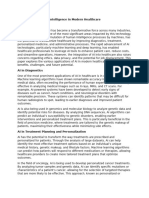TPG
Uploaded by
jonatanskulpe2021TPG
Uploaded by
jonatanskulpe2021The Impact of Artificial Intelligence on Healthcare: Opportunities, Challenges, and
Future Directions
Abstract
Artificial intelligence (AI) has emerged as a transformative force across numerous
industries, and healthcare is no exception. With the ability to analyze vast
amounts of data, recognize patterns, and make predictions, AI offers unprecedented
opportunities to improve patient outcomes, streamline healthcare operations, and
advance medical research. From diagnostic tools to personalized medicine and
administrative efficiencies, AI is poised to revolutionize healthcare systems
globally. However, the integration of AI in healthcare also presents significant
challenges, including ethical concerns, data privacy issues, and the potential
displacement of healthcare workers. This paper explores the current applications of
AI in healthcare, examines the opportunities and challenges associated with its
implementation, and discusses future directions for AI in the medical field.
Introduction
Healthcare systems around the world are facing mounting challenges, including
rising costs, an aging population, and increasing demand for services. At the same
time, advancements in medical technologies and data analytics present new
opportunities for improving healthcare delivery. One of the most promising
technologies in this regard is artificial intelligence (AI).
AI encompasses a variety of technologies, including machine learning (ML), natural
language processing (NLP), and computer vision, which allow machines to mimic human
cognitive functions. In healthcare, AI is being applied to numerous areas, from
medical imaging and diagnostic tools to drug discovery and administrative tasks. By
analyzing large datasets, AI can help healthcare providers make faster, more
accurate diagnoses, personalize treatment plans, and optimize resource allocation.
However, the widespread adoption of AI in healthcare also raises critical questions
around ethical considerations, data security, and the impact on the workforce. This
paper will review the current state of AI in healthcare, explore its potential
benefits, and identify the challenges that must be addressed to fully harness its
potential.
Objectives
The primary objectives of this paper are:
To examine the current and emerging applications of AI in healthcare.
To evaluate the opportunities AI presents for improving patient care, reducing
costs, and advancing medical research.
To identify the challenges and barriers to the successful implementation of AI in
healthcare systems.
To provide recommendations for the future development and integration of AI in
healthcare.
Literature Review
AI in Healthcare: Applications and Impact
The use of AI in healthcare spans a wide range of applications, from clinical
decision-making to operational management. Below are some of the most significant
areas where AI is making an impact:
Medical Imaging and Diagnostics: AI algorithms, particularly deep learning models,
have shown remarkable capabilities in analyzing medical images. AI systems can
assist radiologists in detecting abnormalities such as tumors, fractures, and
lesions in X-rays, CT scans, and MRIs. Research has demonstrated that AI can match
or even exceed the diagnostic accuracy of human experts in certain scenarios. For
example, a 2020 study published in Nature Medicine found that an AI model developed
by Google Health outperformed radiologists in breast cancer screening.
Personalized Medicine: AI is enabling more personalized treatment plans by
analyzing patient data, including genetic information, medical history, and
lifestyle factors. Machine learning models can predict how patients will respond to
specific treatments, allowing for tailored therapies that maximize efficacy and
minimize adverse effects. In oncology, for example, AI is helping identify
personalized drug regimens based on genetic profiling of tumors.
Predictive Analytics and Risk Assessment: AI models can analyze patient data to
predict the likelihood of disease onset or progression. These predictive tools are
used in a variety of fields, including cardiology, diabetes management, and
infectious disease forecasting. AI can help identify at-risk patients early,
allowing for preventive measures and early interventions that improve health
outcomes.
Drug Discovery and Development: The drug discovery process is traditionally slow
and costly, but AI is helping to accelerate this process. Machine learning
algorithms can analyze large datasets of biological information to identify
potential drug candidates and predict their effectiveness. AI models can also
optimize clinical trial designs and analyze patient data to determine the best
course of action.
Clinical Decision Support: AI-powered decision support systems assist healthcare
professionals by providing evidence-based recommendations for diagnosis and
treatment. These systems integrate medical knowledge, patient records, and real-
time data to help clinicians make informed decisions quickly, thereby improving the
quality of care and reducing errors.
Healthcare Operations and Administration: AI is being used to optimize hospital
operations and improve administrative efficiency. Natural language processing (NLP)
tools are streamlining the management of electronic health records (EHRs), enabling
automatic extraction of key information from clinical notes and improving workflow
efficiency. AI is also used for resource management, predicting patient admission
rates, and optimizing staff scheduling.
Opportunities and Benefits of AI in Healthcare
The integration of AI into healthcare has the potential to bring about several
significant benefits:
Improved Patient Outcomes: AI’s ability to process and analyze vast amounts of data
enables more accurate diagnoses and personalized treatment plans. This can lead to
earlier detection of diseases, improved clinical decision-making, and better
overall patient care. For example, AI systems can help identify subtle patterns in
medical imaging that may be missed by human clinicians, allowing for earlier and
more accurate diagnosis of conditions like cancer and heart disease.
Cost Reduction and Efficiency: AI can help reduce healthcare costs by optimizing
resource allocation, reducing diagnostic errors, and minimizing unnecessary tests
and procedures. AI-driven predictive models can help hospitals manage patient flow
more effectively, reducing wait times and improving the utilization of medical
staff and equipment. In addition, AI can automate administrative tasks, such as
coding and billing, freeing up healthcare professionals to focus on patient care.
Accelerating Medical Research: AI is speeding up medical research by enabling the
analysis of vast amounts of data that were previously difficult or impossible to
process. In genomics, for instance, AI algorithms are helping researchers identify
new genetic markers for diseases and understand the underlying mechanisms of
complex conditions like cancer, Alzheimer’s, and cardiovascular diseases. AI can
also help identify potential drug candidates and predict their effectiveness,
significantly reducing the time and cost of developing new treatments.
Global Health Improvements: AI can improve access to healthcare in underserved or
remote areas. AI-powered telemedicine platforms can provide consultations and
diagnostic support to patients in areas with limited access to medical
professionals. In low-resource settings, AI-driven mobile health applications can
assist in monitoring and managing chronic conditions such as diabetes or
hypertension, improving the quality of life for patients who may not otherwise have
access to continuous care.
Challenges and Barriers to AI Adoption
Despite its promise, the implementation of AI in healthcare is not without
challenges. Some of the key obstacles include:
Data Privacy and Security: Healthcare data is highly sensitive, and the integration
of AI requires the collection, processing, and sharing of large amounts of patient
information. Ensuring the privacy and security of this data is critical. Healthcare
organizations must adhere to strict data protection regulations, such as the Health
Insurance Portability and Accountability Act (HIPAA) in the United States or the
General Data Protection Regulation (GDPR) in the European Union.
Bias and Fairness: AI algorithms can inherit biases present in the data they are
trained on, leading to biased predictions or decisions. For example, if training
data lacks representation from certain demographic groups, AI models may be less
accurate for those populations. This can exacerbate health disparities and
undermine the effectiveness of AI in healthcare. Addressing biases in AI models and
ensuring that data is diverse and representative is essential for equitable
healthcare outcomes.
Regulatory and Ethical Concerns: The use of AI in healthcare raises significant
ethical and regulatory questions. For example, when AI systems are used to make
clinical decisions, it may be unclear who is responsible for errors or adverse
outcomes. Determining the appropriate level of oversight and regulation for AI-
powered healthcare technologies is an ongoing challenge. In addition, questions
about patient consent, transparency, and accountability remain unresolved.
Integration into Clinical Practice: Healthcare professionals may be resistant to
adopting AI tools if they do not trust the technology or if they perceive it as a
threat to their jobs. Ensuring that AI systems are integrated into clinical
workflows in a way that complements, rather than replaces, human expertise is
crucial for successful adoption. Education and training will be essential for
healthcare providers to understand and effectively use AI tools.
Cost and Infrastructure: While the costs of AI technologies are decreasing,
implementing AI in healthcare systems still requires significant investment in
infrastructure, including computing resources, data storage, and training. Smaller
healthcare organizations, especially in low-resource settings, may find it
difficult to afford the necessary technology and expertise.
Future Directions for AI in Healthcare
The future of AI in healthcare is both exciting and complex. As AI technology
continues to evolve, we can expect to see further advancements in personalized
medicine, precision diagnostics, and automated healthcare administration. Some key
areas for future development include:
AI in Drug Discovery: The ongoing development of AI tools for drug discovery and
clinical trial optimization will accelerate the identification of novel therapies
and speed up the time-to-market for new drugs.
AI and Robotics in Surgery: Robotic surgery systems powered by AI could further
revolutionize surgery, offering greater precision, minimizing human error, and
reducing recovery times for patients.
AI for Mental Health: AI could play an important role in mental health care,
helping diagnose conditions such as depression and anxiety, and offering
personalized interventions through chatbots, apps, and virtual care platforms.
Collaboration between Humans and AI: In the future, AI is likely to function more
as a collaborative partner with healthcare professionals, augmenting human
decision-making and enhancing clinical judgment, rather than replacing it.
Conclusion
Artificial intelligence has the potential to revolutionize healthcare by improving
patient outcomes, reducing costs, and accelerating medical research. However, the
widespread adoption of AI in healthcare comes with challenges, including data
privacy concerns, algorithmic bias, regulatory issues, and the integration of AI
systems into clinical practice. By addressing these challenges and continuing to
invest in AI research and development, healthcare systems can harness the power of
AI to create more efficient, equitable, and effective healthcare solutions.
Recommendations
Invest in AI Research and Development: Governments, academic institutions, and
private companies should continue to invest in AI research to develop more
accurate, efficient, and unbiased AI systems for healthcare.
Establish Clear Ethical Guidelines: Policymakers should develop ethical frameworks
for the use of AI in healthcare, ensuring patient safety, data privacy, and
equitable access to care.
Promote Collaboration between AI Developers and Healthcare Providers: To ensure
that AI systems meet the needs of clinicians and patients, collaboration between AI
developers, healthcare providers, and regulatory bodies is essential.
Address Workforce Displacement Concerns: Healthcare organizations should provide
training and upskilling programs to ensure that the workforce can adapt to the
changing technological landscape.
References
Esteva, A., Kuprel, B., Novoa, R. A., et al. (2017). Dermatologist-level
classification of skin cancer with deep neural networks. Nature, 542(7639), 115–
118.
Topol, E. (2019). Deep Medicine: How Artificial Intelligence Can Make Healthcare
Human Again. Basic Books.
Hinton, G., Vinyals, O., & Dean, J. (2015). Distilling the Knowledge in a Neural
Network. Advances in Neural Information Processing Systems (NeurIPS), 28.
You might also like
- Mark Sloan, Ray Peat, Raymond Peat - The Ultimate Guide to Methylene Blue_ Remarkable Hope for Depression, COVID, AIDS & Other Viruses, Alzheimer’s, Autism, Cancer, Heart Disease, ... Targeting Mitoch100% (15)Mark Sloan, Ray Peat, Raymond Peat - The Ultimate Guide to Methylene Blue_ Remarkable Hope for Depression, COVID, AIDS & Other Viruses, Alzheimer’s, Autism, Cancer, Heart Disease, ... Targeting Mitoch171 pages
- DC-09 Preparing For ANSI Public Review (TCPIP)No ratings yetDC-09 Preparing For ANSI Public Review (TCPIP)44 pages
- AI's Impact on Modern Healthcare ResearchNo ratings yetAI's Impact on Modern Healthcare Research3 pages
- The Impact of Artificial Intelligence on HealthcareNo ratings yetThe Impact of Artificial Intelligence on Healthcare2 pages
- The Impact of Artificial Intelligence On Modern Healthcare0% (1)The Impact of Artificial Intelligence On Modern Healthcare3 pages
- The_Potential_Application_of_Artificial_Intelligen (1)No ratings yetThe_Potential_Application_of_Artificial_Intelligen (1)13 pages
- The Role of Artificial Intelligence in HealthcareNo ratings yetThe Role of Artificial Intelligence in Healthcare3 pages
- The Role of Artificial Intelligence in HealthcareNo ratings yetThe Role of Artificial Intelligence in Healthcare2 pages
- The Role of Artificial Intelligence in HealthcareNo ratings yetThe Role of Artificial Intelligence in Healthcare2 pages
- The Influence of Artificial Intelligence on Modern HealthcareNo ratings yetThe Influence of Artificial Intelligence on Modern Healthcare4 pages
- The Impact of Artificial Intelligence On HealthcareNo ratings yetThe Impact of Artificial Intelligence On Healthcare3 pages
- [IJCST-V13I2P7]:Vardant Tyagi, Pradeep Singh BishtNo ratings yet[IJCST-V13I2P7]:Vardant Tyagi, Pradeep Singh Bisht9 pages
- The Impact of Artificial Intelligence On Healthcare100% (1)The Impact of Artificial Intelligence On Healthcare2 pages
- Artificial Intelligence in Healthcare Opportunities and ChallengesNo ratings yetArtificial Intelligence in Healthcare Opportunities and Challenges3 pages
- The Impact of Artificial Intelligence On HealthcareNo ratings yetThe Impact of Artificial Intelligence On Healthcare2 pages
- The Role of Artificial Intelligence in Modern HealthcareNo ratings yetThe Role of Artificial Intelligence in Modern Healthcare4 pages
- The Impact of Artificial Intelligence in HealthcareNo ratings yetThe Impact of Artificial Intelligence in Healthcare2 pages
- The Impact of Artificial Intelligence On Healthcare OutcomesNo ratings yetThe Impact of Artificial Intelligence On Healthcare Outcomes4 pages
- R1 - The Role of Artificial Intelligence in HealthcareNo ratings yetR1 - The Role of Artificial Intelligence in Healthcare2 pages
- The Role of Artificial Intelligence in Modern HealthcareNo ratings yetThe Role of Artificial Intelligence in Modern Healthcare2 pages
- Integrating_Artificial_Intelligence_intoNo ratings yetIntegrating_Artificial_Intelligence_into13 pages
- Artificial Intelligence in Healthcare Diagnosis TRNo ratings yetArtificial Intelligence in Healthcare Diagnosis TR10 pages
- The Impact of Artificial Intelligence on Modern HealthcareNo ratings yetThe Impact of Artificial Intelligence on Modern Healthcare2 pages
- The Rise of Artificial Intelligence in HealthcareNo ratings yetThe Rise of Artificial Intelligence in Healthcare5 pages
- Improving Diagnostics and Personalized MedicineNo ratings yetImproving Diagnostics and Personalized Medicine2 pages
- Transforming Healthcare: The Role and Impact of Artificial IntelligenceFrom EverandTransforming Healthcare: The Role and Impact of Artificial IntelligenceNo ratings yet
- AI in Healthcare: Innovations That Save Lives: Micro Book: C3 - Series AI in Everyday LifeFrom EverandAI in Healthcare: Innovations That Save Lives: Micro Book: C3 - Series AI in Everyday LifeNo ratings yet
- The Explosion of Artificial Intelligence and the Unimaginable FutureFrom EverandThe Explosion of Artificial Intelligence and the Unimaginable FutureNo ratings yet
- Kuppam Engineering College, Kuppam-517425: Modern Control Theory Chapter Wise Descriptive QuestionsNo ratings yetKuppam Engineering College, Kuppam-517425: Modern Control Theory Chapter Wise Descriptive Questions5 pages
- Kicking in Soccer: Kicking: Art and SportsNo ratings yetKicking in Soccer: Kicking: Art and Sports33 pages
- Full Business Statistics: Australia and New Zealand 1st Edition - Ebook PDF Ebook All Chapters100% (4)Full Business Statistics: Australia and New Zealand 1st Edition - Ebook PDF Ebook All Chapters49 pages
- Longitudinal Observation of Anxiety and Depression Among Palliative Care Cancer PatientsNo ratings yetLongitudinal Observation of Anxiety and Depression Among Palliative Care Cancer Patients14 pages
- Tips-And-Tricks-To-Speed-Aws-Deployment PDFNo ratings yetTips-And-Tricks-To-Speed-Aws-Deployment PDF7 pages
- Acc224 - Week Two - Constituional and Regulatory Framework - Tsa - Fin MGT ReformsNo ratings yetAcc224 - Week Two - Constituional and Regulatory Framework - Tsa - Fin MGT Reforms98 pages
- How to Treat Undifferentiated Arthritis Today or Tomorrow a ConsiderationNo ratings yetHow to Treat Undifferentiated Arthritis Today or Tomorrow a Consideration8 pages
- Business Mathematics (Qts0103) Continuous Assessment 1 Individual Assignment (30%)No ratings yetBusiness Mathematics (Qts0103) Continuous Assessment 1 Individual Assignment (30%)3 pages
- Assurance Time Allowed - 2 Hours Total Marks - 100No ratings yetAssurance Time Allowed - 2 Hours Total Marks - 1001 page
- Daftar Pustaka: Statement of Financial Accounting Concepts No.6. Norwalk: FASBNo ratings yetDaftar Pustaka: Statement of Financial Accounting Concepts No.6. Norwalk: FASB2 pages
- Subject: Behind My Success... - 3 Hello MumbaiNo ratings yetSubject: Behind My Success... - 3 Hello Mumbai22 pages
- SOLIS-Export-Limit-Settings-Using-a-Meter-V2No ratings yetSOLIS-Export-Limit-Settings-Using-a-Meter-V23 pages

























































































